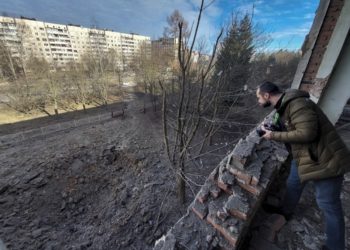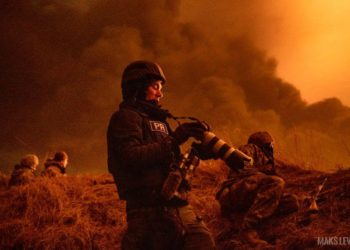Monitoring the security situation allows the National Union of Journalists of Ukraine (NUJU) to create a holistic picture of the state of the Kharkiv Region’s media industry and identify the needs of journalists
“The editor visits villages 1-5 kilometers from the enemy every week. He flies over them every day…” This is not the plot of a war movie – this is the reality in which journalists in the Kharkiv Region work. Despite constant shelling, power outages, and communication disruptions, they continue their work because they understand that people need reliable information more than ever.
In frontline cities and villages, the local newspaper often remains the only reliable source of news. Editorial teams are forced to overcome the challenges of war every day: work during curfews, look for safe routes to collect information, and fight cyberattacks. At the same time, many newsrooms have lost premises, equipment, and some employees.
In order to study the real state of affairs and the needs of regional media, the NUJU conducted a survey of newsrooms in the Kharkiv Region. Twelve newsrooms took part in the study, from small district newspapers to city television and radio companies. Their answers paint a picture of incredible resilience and professional dedication to the cause.
Monitoring in August 2024 was carried out by Iryna Khromenko, the profile coordinator of the network of Journalists’ Solidarity Centers of the NUJU. This network operates in partnership with the International and European Federations of Journalists, with the support of UNESCO and the people of Japan. It should be noted that since then, the situation has only worsened.
Donor support remains a lifeline for the Kharkiv Region’s media
During two years of full-scale war, it was donor assistance that became the key factor in survival for most Kharkiv Region’s media. The range of support turned out to be wide: from financial, which all surveyed editorial offices received, to technical, which 11 out of 12 publications used.
Donors also paid significant attention to the development of professional competencies: eight newsrooms sent employees for training, and half of the publications received mentoring support. However, there is a noticeable gap in psychological support – only one media outlet used it.
The NUJU became the most frequently mentioned organization among those who helped media workers in the region.
“The National Union of Journalists of Ukraine plays a key role in supporting newsrooms during the crisis,” the respondents noted. Other organizations also made a significant contribution: UAMB, IMI, Internews/Internews Ukraine, Institute for Regional Media and Information (IRMI), the Academy of Ukrainian Press, and Lviv Media Forum. Among international partners, Reporters Without Borders and IREX were the most active.
Currently, the situation with donor support is worrying – only five out of 12 newsrooms had projects at the time of the survey. Four publications participated in the IRMI and Fondation Hirondelle project called Enhancing the Resilience of Ukrainian Media, funded by Swiss Solidarity (until November 2024). Another newsroom works with Internews Network under a six-month program.
Such statistics indicate the need to expand donor support to ensure the sustainable development of local media in the frontline region.
ABOUT UNESCO
UNESCO is the United Nations Educational, Scientific, and Cultural Organization. It contributes to peace and security by promoting international cooperation in education, sciences, culture, communication, and information. UNESCO promotes knowledge sharing and the free flow of ideas to accelerate mutual understanding. It is the coordinator of the UN Action Plan on the Safety of Journalists and the Issue of Impunity, which aims to create a free and safe environment for journalists and media workers, thus strengthening peace, democracy, and sustainable development worldwide. UNESCO is working closely with its partner organizations in Ukraine to provide support to journalists on the ground.
The designations employed and the presentation of material throughout this digest do not imply the expression of any opinion whatsoever on the part of UNESCO concerning the legal status of any country, territory, city, or area or its authorities or concerning the delimitation of its frontiers or boundaries.
The authors are responsible for the choice and the presentation of the facts contained in this digest and for the opinions expressed therein, which are not necessarily those of UNESCO and do not commit to the organization.
Liudmyla Maznova,
NUJU Information Service

 THE NATIONAL UNION OF
JOURNALISTS OF UKRAINE
THE NATIONAL UNION OF
JOURNALISTS OF UKRAINE
















Discussion about this post